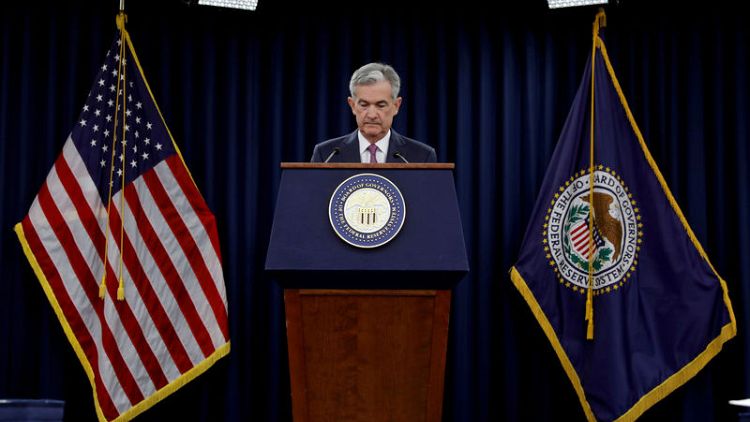By Jonathan Spicer
NEW YORK (Reuters) - The Federal Reserve, under pressure from a critical White House even while it largely hits its inflation and employment targets, will conduct an extensive review next year of how it guides the U.S. economy as it seeks to become more open and accountable.
The U.S. central bank said on Thursday it will hold a series of forums across the country to hear from a "wide range" of stakeholders.
By the time the review wraps up around mid-2019, it could lead to a rethink of the tools the Fed uses to achieve its goals and the way it communicates policy to the public and financial markets.
The unusual announcement suggests that Fed Chairman Jerome Powell, who took over as head of the central bank in February, wants to quicken its decades-long march toward greater transparency and accountability in order to head off any damaging political interference.
President Donald Trump has publicly slammed the Fed's gradual interest rate hikes, saying higher borrowing costs threaten the economic expansion.
"Now is a good time to take stock of how we formulate, conduct, and communicate monetary policy," Powell said in a statement, noting that the Fed was close to meeting its inflation and employment goals.
The Fed plans to host a series of events, including a research conference at its Chicago branch in June, to support the review. Policymakers then plan to discuss the perspectives gained and report their findings.
In the wake of the 2007-2009 financial crisis and recession, the Fed leaned on powerful but unconventional tools such as the purchase of trillions of dollars of bonds and promises of near-zero interest rates over extended periods. It also began publishing individual policymakers' anonymous forecasts for future rate hikes and key economic metrics.
While no changes are guaranteed, all of those tools could be up for debate not just by economists and investors but also workers, employers and civic leaders.
"We're not just locked into policy, because that's what we did before," Atlanta Fed President Raphael Bostic said in Madrid on Thursday about alternative frameworks.
UNDER BROADER MICROSCOPE
The Fed's goals of both maximum sustainable employment and stable inflation are set by Congress and not to be part of the review. Nor does the Fed intend the process to debate whether to change its 2 percent inflation target, or use it to tackle shorter-term questions such as how best to control interest rates or when to stop the current rundown of the central bank's balance sheet.
But the review, at a time of shifting power dynamics on Capitol Hill and heightened grassroots focus on the Fed, could evolve in unpredictable ways.
Labor-allied groups have lobbied the Fed to use inflation as a tool to boost wages, for example, and could see the review as an opening to make their case.
And with control in Congress now to be split following the November elections - with Democrats in the majority in the House of Representatives and Republicans in majority in the Senate - and a presidential election looming, congressional leaders may also seek to put their print on the Fed's discussion.
For the Fed, it may be just a chance to review lessons learned from the financial crisis.
Now that the economy is growing well above potential, unemployment is down to 3.7 percent and inflation is roughly at the Fed's target, the central bank has settled into a quarterly rate-hike cycle. The review suggests the Fed is taking advantage of calm waters to decide what may work best in the next downturn.
Options could include choosing an inflation range rather than a narrow target, adopting a "price level" approach that would allow for an inflation overshoot, targeting nominal gross domestic product instead of inflation, or even raising the target altogether.
"None of these alternative frameworks are without challenges, but all are worth thorough review," Cleveland Fed President Loretta Mester said in an October speech in New York. "It might be useful to do something akin to simulated stress testing to see how each framework might fare."
(Reporting by Jonathan Spicer; Additional reporting by Jason Lange, Howard Schneider and Ann Saphir; Editing by Marguerita Choy, Paul Simao and Leslie Adler)



